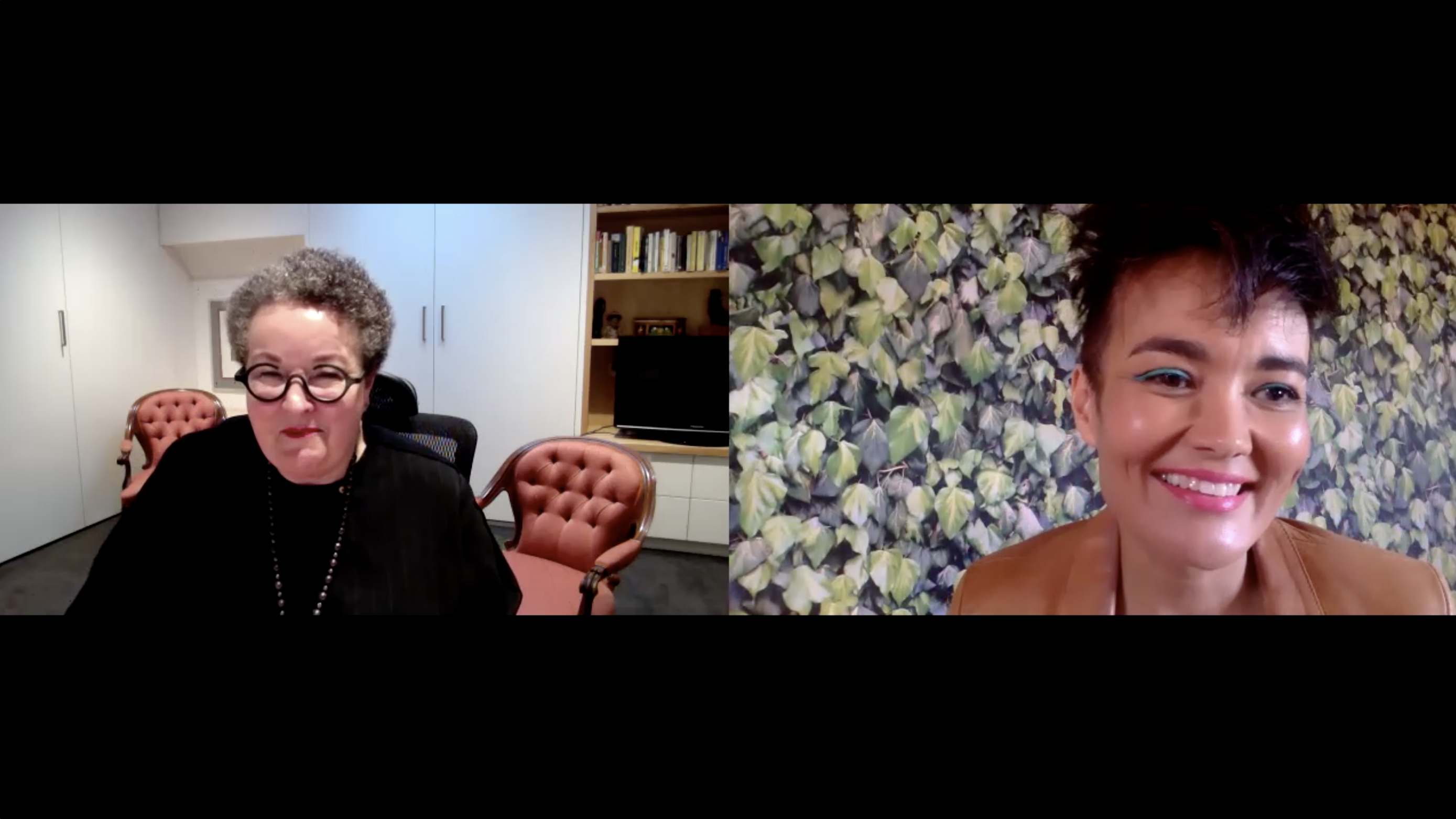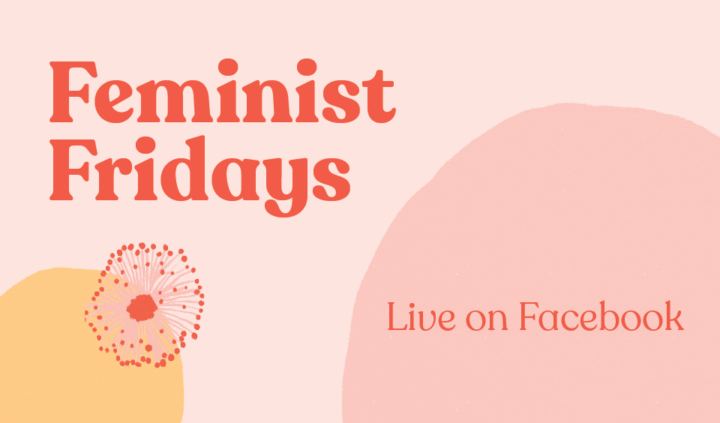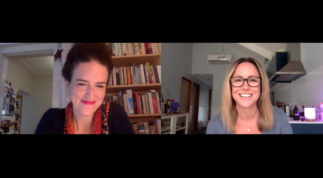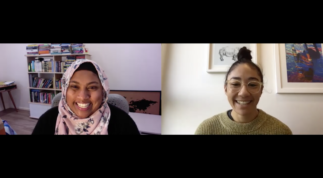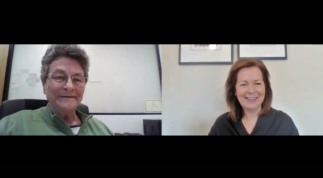The fourth edition of Feminist Fridays, presented by the Victorian Women’s Trust, went live on Friday 12 June.
Featuring Yumi Stynes (Podcaster & Author) and Prof. Jane Fisher (Professor of Global Public Health) talking about motherhood in a pandemic.
Feminist Fridays is fortnightly live stream series, featuring two feminists talking about the issues that matter. Each chat is broadcast live on the Trust Facebook page. Next edition: Friday 26 June 2020, 12pm AEST, speakers soon to be announced.
Catch up on their conversation now, and read the full transcript below:
Transcript:
Yumi Stynes: Hello let’s begin by acknowledging the traditional owners, who if we were paying rent would be comfortable, wealthy and prosperous landlords of the land on which we meet today. The Gadigal of the Eora Nation never ceded this land. And it’s important I acknowledge their loss, and ongoing disrespect that they have been shown, and as best I can I pay my respects to their elders, past and present.
Welcome everybody, to Feminist Friday! This is a fortnightly series of live conversations between feminists, on the issues that matter, and we get to have a say about what issues matter because it is Feminist friday (laughs).
Now the idea is, that it’s short, sharp and to the point. Something that you could watch over lunch, or just quickly when you want to catch up later. To make sure that you don’t miss the next one, please follow the Victorian Women’s Trust and RSVP to all the forthcoming Feminist Friday events. If you want to spread the word on twitter, remember to use the hashtag #FeministFridays and of course it’s free, so get amongst it and tell your friends.
My name is Yumi Stynes, I am an author and broadcaster and very much an advocate for anti-racism and women’s rights. I’m here with the esteemed Professor Jane Fisher, who is a clinical and health psychologist specialising in the intersections of mental health, reproduction and family. The Professor is also an expert technical advisor to international agencies like the World Health Organisation.
Prof. Jane Fisher: Well Yumi, I’m very pleased to be here, and delighted to see you again and although this is our first chat together for a Feminist Friday we have quite a lot of things in common. And in particular, we’re both mothers. Now my children are of a different age to your children, but we’re both passionate about women’s reproductive health and mental health across the life course. And Yumi, you wrote a book called Welcome to your period, which is about a very important stage of the life-course.
But let’s get started, I think what we want to talk about today is what has 2020 been like for women who are mothers, here in Australia and beyond? So Yumi, you’ve actually got children at home. Tell us a little bit about what that experience has been like for you?
Yumi Stynes: Jane, it’s been a shit show! That’s what it’s been like! It’s been an absolute debacle!
So, I’ve got four, I’ve got two teenage girls and two little ones, one just turned six, and one’s four. And especially with the two little ones, it’s been really really hectic and hard.
It’s been one calamity after another. We’ve watched Australia burn with the bushfires, then we went into this unprecedented pandemic, and now Black Lives Matter, just people’s heartbreak spilling out onto the streets. So I don’t know how to feel positive some days to be honest, as a mother, and as someone who cares about these issues so much.
Prof. Jane Fisher: Look I think this confluence of events as you’ve described, has really taken a completely unknown turn in our lives, but it has had a profound impact on people’s wellbeing, including their capacity to plan and organise, their capacity to feel emotionally stable, their irritability, their capacity to feel optimistic about the future.
I wonder if I could talk to you a little bit about what we’ve learnt through a huge national survey, filled in by nearly 14000 generous people? Who told us what they’ve been experiencing, especially under the COVID restrictions. And one of the groups of really been finding it the hardest are women in your situation, so caring for dependent children or family members at home. Trying to manage both paid and unpaid work during this circumstance and the people who I think of finding it hardest are those who have actually lost income generating work while continuing to manage all of these responsibilities. And of course they do that in a context in which some of the things they rely on like childcare and schools have been really not able to operate in their usual ways.
So, I think there are a number of important things that people should be aware of which is this is a normal human response to a very abnormal circumstance and that we should be cautious about labelling this as pathological, more we should say what we should do to help…
Yumi Stynes: So Jane, could I just just jump in here? So, everything that you just said is so true for me. One of the things that I did for my mental health, was I went to the gym everyday. And that’s just been, I’m not allowed. So it’s just something that I felt that I could do guiltlessly and now, I actually just can’t do it. But when you say we react to women in this way and we need to understand what it is, what sort of thing are you describing there, is it like a mental breakdown or is it just hysteria or anger?
Prof. Jane Fisher: I wouldn’t use terms like hysteria but what we’ve documented is much much higher than at non covid times. Symptoms of despondency and despair and of anxiety and many people saying they’re feeling much more irritable than they usually do.
And these are really reflections I think of the impact of the circumstances you describe. I think exacerbated by the uncertainty, of not knowing how long this would go on for. Not knowing whether we would ever get back to the kind of usual state that we are used to to being in.
Yumi Stynes: And did you find Professor, that a lot of women were bearing the greater burden of the child rearing and?
Prof. Jane Fisher: Yeah. We did find that. The greater burden of these mental health problems, if we want to call them those, were being born by women. But not by all women as a whole group, but it was particularly for women who were caring for dependent family members.
So young children, people with disabilities, older family members and those who were having to combine that with the impact of having a reduction in income or a loss of income.
Yumi Stynes: Yeah one of my work elements is a lot of public speaking, that I get paid for and it all just evaporated. So I still had other work but it was just, suddenly a huge chunk of my income was just decapitated and I had to just keep going as well as parent the kids.
One of the things I wrote about in a blog for this actual podcast or this broadcast, was about how my partner is actually super supportive, and we try to have a pretty even gender distribution of domestic work. Nonetheless, I was still up to here you know, and I think it’s not necessarily unique to heterosexual couples, I think it’s like everybody with children is perhaps is just really struggling to do what schools used to do for us.
Prof. Jane Fisher: I think that’s absolutely right, that this is not limited to one particular group and as you say, it can be in couples who are functioning well and are trying to solve this problem respectfully together, it’s just that the workload is too big. There is an enormous amount involved in education and care of children, especially when you have no access to the external resources that would normally be contributing to that.
Yumi Stynes: Totally. Like the swimming pool, we miss the pool so much! Do you know what, I feel better that you’ve said that, I feel a bit more relieved that I’m not a dysfunctional person that couldn’t get it right.
Jane, one of the things that I can’t stop thinking about, and I was so glad to be able to ask you about this because I know that your research really sits in the pocket of this question. Is how tough it must have been for pregnant women, women trying to get pregnant and then women giving birth during that lockdown period, when everybody was in a state of hypervigilance and stress..and then this idea of bringing a precious baby into an infected world.
Did you see and I guess an adaptation made to accommodate these women?
Prof. Jane Fisher: Well ah I think services have made every effort to say, we are open for business as usual, but of course business as usual has changed enormously. Some of the things that really contributed to anxiety for women who are pregnant was the prospect that they might have to give birth alone, without even their partner there.
But there are still those marked changes, so it has been that many women have had to go to antenatal visits without their partner, when they would have otherwise preferred to be going together. And once they go into hospital to give birth, no one is allowed to visit them. So they’re not allowed to have grandparents or friends there.
And I think that, the next thing that’s really been very difficult for women, is that the Mother’s groups that are such an important source of support have not been able to meet in person. And so there’s a WhatsApp kind of substitute, but I don’t think it’s a very good substitute for the kinds of things women need after they give birth.
Yumi Stynes: There are a lot of women at that time, sitting out in the park with their mothers group with the blanket out. That’s the time that they are sitting out in the sun, literally getting sun on their bodies, and fresh air and a chance to just literally breath in. And they are missing that they are having to be stuck at home inside.
Prof. Jane Fisher: And they are not having that opportunity for mutual peer-to-peer, ‘how did you manage this?’ ‘what’s this been like for you?’.
Or having access to the child and family health nurse, who might be able to answer some of those questions. Those consultations have been very altered.
So I think you’re right to raise this group, is a group with particular needs that have not been well met. And that might well take a toll further down the track.
Yumi Stynes: Is there anything that we can do as friends, partners or supporters of these women?
Prof. Jane Fisher: Look, I think if you know someone in your circle who’s pregnant or recently given birth, this is really a time to reach out intentionally.
And as soon as it’s possible to meet in person so, to invite them over, to take meals to them, to go and see their baby, so you can witness this lovely event and celebrate this event in the way that usually the birth of a baby is acknowledged and celebrated. I think this will make an enormous difference, and I am hoping that very soon, normal, peer-to-peer meetings between people with new parents will be encouraged and permitted.
Yumi Stynes: I feel like having a cry Jane, it’s such a lovely thought. You know, the smell of the new baby, and then all the grandparents missing out on meeting their loved ones. I dropped over some of my famous chicken soup to a good friend who had a baby two weeks ago, so it’s the third batch I’ve made, the baby’s going to be breast fed on chicken meal power, chicken soup power.
We got an email from my son’s daycare this week. Basically saying the government announced that it’s rolling back the free childcare measures, withdrawing Jobkeeper support for childcare workers. Jane, what do you think this will mean for us? For parents, I guess, of young kids.
Prof. Jane Fisher: Well, we know that centre based childcare is of crucial importance to families, and it’s of enormous importance in enabling women and men to engage in income generating work, as well as providing care for their children.
So I think this has to have an effect and it will be a particularly profound effect, I think, on people who have lost their income generating work. And we know that many people have lost this, and disproportionately that women have lost this work. That it will have to have an impact on their capacity to participate, to be able to have the benefits of an external life; a life that’s involved in the workforce while they’re caring well for their children. In my opinion it’s still a bit early days to know what that impact will be, but I think we have to be very alert to giving people an opportunity to tell us what it’s like.
Yumi Stynes: Ok, so be good listeners?
Prof. Jane Fisher: Be good listeners, be good researchers, asking very well informed questions. Be powerful public advocates, like you are Yumi, of broadcasting what you hear so that there is an opportunity for it to influence policy. And if this turns out to be a policy that was unwise, that we can have a capacity to influence change.
Yumi Stynes: You know you are, I would prefer to say, extremely accomplished professor Jane. In your work, what have you found is the most effective way to influence policy? Like, if it’s a mum of kids watching this at home, saying ‘yeah I want to get involved, what can I do’, what would you say she could get started with?
Prof. Jane Fisher: Look I think that there are many things we can do to influence policy, but probably the most important ones are ones where we encourage public discussion. So, ringing in to radio TalkBack, contributing to forums like this, writing to the newspaper. All of those things are read and observed. Participating in surveys, especially those that give you an opportunity to write something that tells others of what the experience was like.
Yumi Stynes: You love a good survey, don’t you Jane?
Prof. Jane Fisher: Well I think they’ve been an extraordinarily powerful way of gathering the experience of whole groups of people. And, you know, I think government policy makers prefer to hear from what a whole population is thinking compared with individual anecdotes. Although the individual stories are very important too and we can’t position them against each other, but they both are very important, I think, ways of influencing policy.
Yumi Stynes: Just on that, I did a cross with ABC Drive the other day, talking about the gender beauty grap and how much more time women spend on grooming, and money they spend on grooming, than men. And all the callers were men saying ‘I spend a lot of time, I spend an equal or greater amount of time, on my grooming’. And it was very interesting, because it wasn’t their space to have that conversation but they couldn’t resist and they took the space. What you’re saying is women should take that space too, if they can.
Prof. Jane Fisher: Well, not unlike you, I have a regular time on ABC Radio with Raf Epstein on a Monday afternoon. A program we call Life and Other Catastrophes. And we initially started it nine years ago as an opportunity, we hoped, for women to ring up with their experiences. But really we are interested that men often use this opportunity, including to talk about things that might incur shame or embarrassment, but the anonymity of radio enables them to do it. So we’re still going with our program nine years later and it’s absolutely wonderful when women ring up and have the generosity to share their experiences publicly. And it has a big impact.
Yumi Stynes: You’re absolutely right. I think that, we want to mobilise, we want to be heard and make real change as mothers and as advocates for mothers of young children. So I’m trying to take away some learnings from this today Jane. I want to ring more talkback radio, write letters to my MPs, I guess, and ring them as well. You know it takes a fair bit of courage to pick up the phone in those situations.
Prof. Jane Fisher: It really does take courage. And I think often people can feel I can’t find the words to say it. So there is benefit I think in saying it with others. So if your whole mothers group has this experience, it’s really worth writing to your MP. Or posting something on a blog that tells them what this experience is like. The best thing I think that people can do is not just talk about the problem, but suggest what might be a helpful solution.
Yumi Stynes: Totally. Totally.
Prof. Jane Fisher: If people can give thoughts to that I think that is really helpful, too.
Yumi we know that women are working really hard, including women in your life situation with a household full of young children and teenage children. Have you got any final thoughts on what mothers can do to look after themselves and find the support they need at this life phase?
Yumi Stynes: Yeah look I think it’s something that we talk about constantly and there’s no easy solution. But I think it’s a little bit of reclaiming what some might call selfishness for women. I don’t think it’s selfish at all.
The way I like to think of it is, I am CEO of my family. I am the breadwinner, I am the one that goes to work to pay the rent and cook the food, so I need to treat myself as a very valuable asset. Not just my mental health, but my physical health, and they’re entwined. So often I think of it as like, I am a weapon and life is a war and I need to be in tip top shape. You know, I need to be fighting fit literally. So that’s one of the things I take quite seriously. In service to my family I need to first serve myself.
And so I do take all of that stuff really really seriously, and to give some thought to the things that give me pleasure and joy which are outside of my family. So it might be, like, one of those friends where you sit together and you just laugh your guts, deep in your guts, you know. Somebody like that in your life, and making an effort to go, you know what, that person is good for me. I’m going to go and seek her out, we’re going to hang, we’re going to laugh, right. So that kind of thing where it’s very much investing in what can feel like a selfish way, in yourself. I think that’s a great starting point for mums.
Prof. Jane Fisher: Well I endorse it wholeheartedly, and I’m at a different life stage to you. But like you, I’m the breadwinner in our household. And being in great shape myself, psychologically and physically, is just essential to being able to maintain a capacity to contribute professionally. But also a capacity to ensure my family is functioning at its best.
So, I think there are lots of things that this moment can teach us. And I wondered what you thought about the ways we support women now and into the future, and whether you’ve got any sort of final thoughts on that?
Yumi Stynes: Well yes and I might return the question to you in a sec Jane. But I do have some final thoughts. Which is, one of the things we’ve learnt from this, particularly COVID-19 was a real ability to cherish our good health, if we have it. And understand what a valuable asset that is. And I very much hope that the flip side of that learning is to diminish the importance of material wealth and possessions as a thing in our lives that we need. And that sort of manic accumulation of stuff that we’ve all, like a lot of us have been, you know, part of for the last, through our adult lives. To just go, you know what, maybe we don’t need that stuff. Maybe I got more pleasure out of baking a sourdough loaf than I could have imagined, or growing bok choy from a seed. And also spending that time with my kids and finding out what they actually learn at school. Like, all of those sort of lessons that we’ve taken from lockdown and COVID, maybe we can apply to real life.
Prof. Jane Fisher: I think that’s a great thought.
I think one of the other things is people appreciating the pleasure of taking things a bit more slowly. Being able to have less hurried conversations, not being, trying to endlessly get out of the house in a hurry. And that this is actually nourishing to us, to do things at a more measured pace.
So the next Feminst Friday is in a fortnight, on June the 26th. You need to follow VWT to get the latest guest announcements. And Feminist Fridays are bought to you by the Victorian Women’s Trust. If you’d like to support these events and our work towards gender equality, you can make a tax deductible donation towards our End of Financial Year appeal at vwt.org.au/donate. So, thank you to Yumi and thank you to everyone for tuning in.
Yumi Stynes: Thanks Jane, have a great weekend and enjoy the rest of your Friday, we’ll see you later.
Prof. Jane Fisher: Thanks Yumi, bye bye.
Yumi Stynes: Bye.
The next Feminist Fridays will be broadcast at 12pm AEST on Friday 26 June 2020 on the Trust Facebook page.
